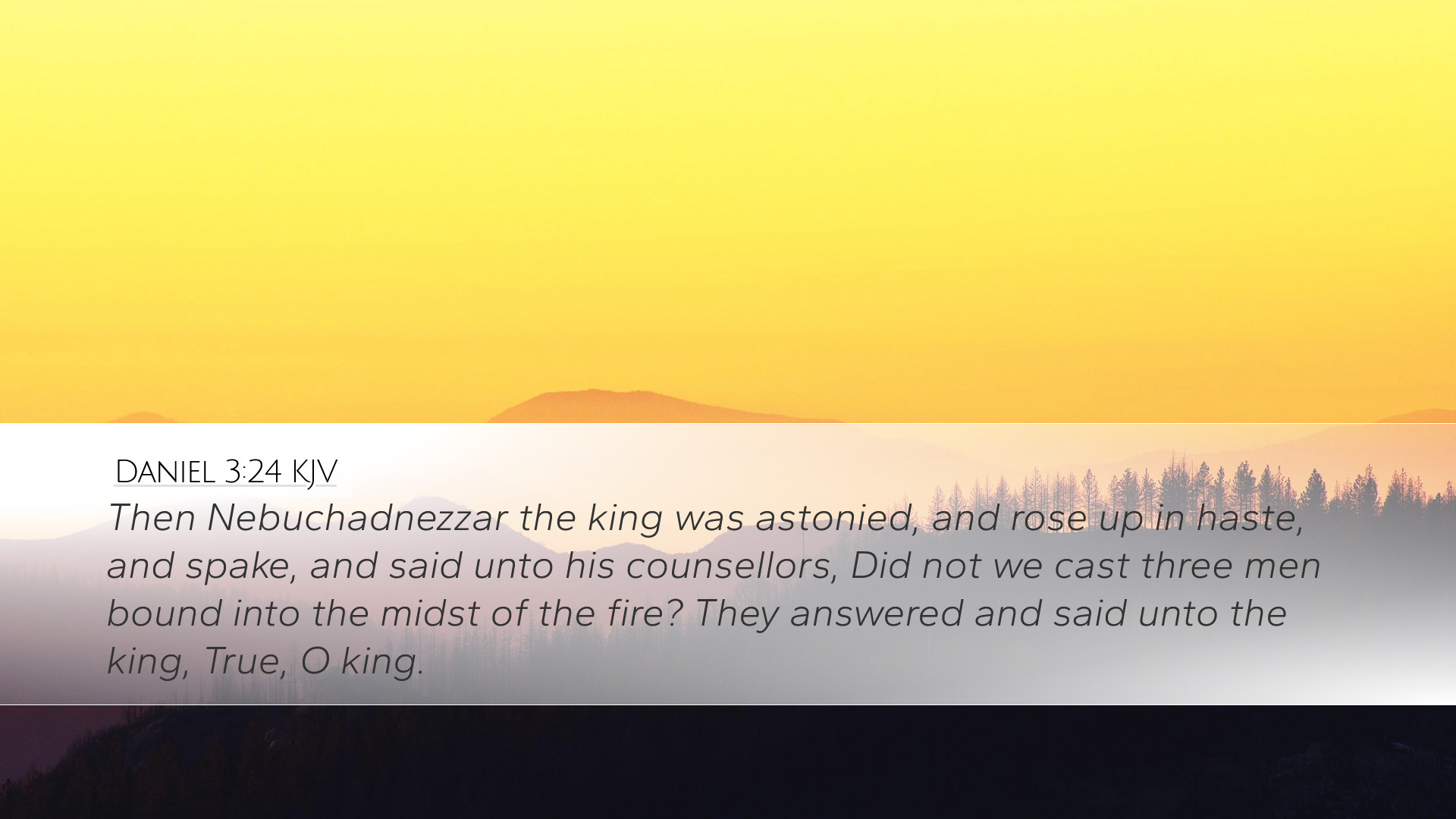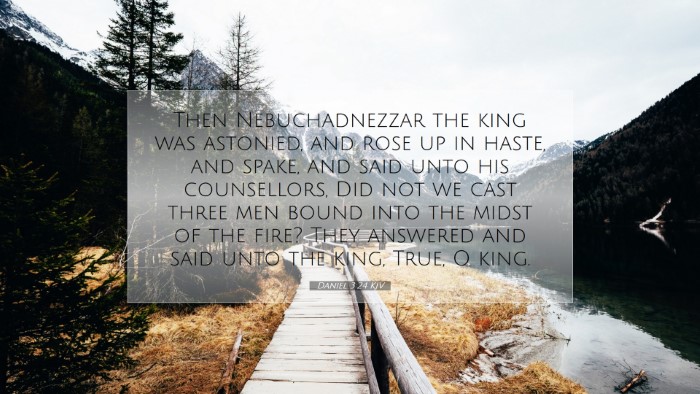Commentary on Daniel 3:24
The verse in question captures a moment of divine intervention and profound theological significance. It depicts a scenario where King Nebuchadnezzar witnesses an event that defies human understanding and prompts analysis from various public domain commentaries. Here, we delve into insights from Matthew Henry, Albert Barnes, and Adam Clarke, offering a tapestry of reflections suitable for pastors, students, theologians, and Bible scholars.
Contextual Background
In Daniel 3, we see Shadrach, Meshach, and Abednego facing the wrath of Nebuchadnezzar for their refusal to worship the golden image. This chapter is a testament to faith and obedience amidst adversity, illustrating a fundamental theme of the book of Daniel: the sovereignty of God over earthly kings.
Verse Overview
Daniel 3:24 states, "Then Nebuchadnezzar the king was astonished and rose up in haste, and spake, and said unto his counselors, Did not we cast three men bound into the midst of the fire? They answered and said unto the king, True, O king." This verse encapsulates the moment of realization that divine protection is at work, serving as a critical pivot in the narrative.
Matthew Henry's Insights
Matthew Henry notes the astonishment of King Nebuchadnezzar as a reflection of God's unparalleled power. He emphasizes how this moment serves to illustrate God’s ability to deliver His people from the most dire of circumstances. Henry points out that the king’s astonishment leads him to question the very reality of what he's witnessing, highlighting the miraculous nature of the deliverance experienced by the three men.
- Henry asserts that the fiery furnace, meant to be a tool of execution, becomes a stage for God’s glory to shine brighter.
- He also addresses the theological implications of this event, asserting that it foreshadows the ultimate victory of God’s people over their oppressors, a theme echoed throughout scripture.
Albert Barnes' Analysis
Albert Barnes offers a practical interpretation, emphasizing the historical and cultural background of Babylonian authority and the extreme measures taken against those who defy it. He explains that the king’s immediate reaction of surprise emphasizes the inexplicable nature of the event:
- The mention of the counselors serves to highlight the seriousness of the situation and the king’s need for validation of what he sees, illustrating a turning point in his understanding of divine power.
- Barnes further elucidates how this event serves as a testimony to all in Babylon that the God of Israel is not only able to save but is present with His people even in their trials.
Adam Clarke's Commentary
Adam Clarke provides a thorough exegetical approach, focusing on the significance of the phrase "Did not we cast three men bound into the midst of the fire?" Clarke notes that this rhetorical question reflects the king’s disbelief and illustrates the miraculous nature of God’s intervention:
- Clarke emphasizes the implications of fire, representing trial and persecution, yet these men walk unscathed — a potent image of faith being rewarded.
- His commentary draws attention to the spiritual truth that, while earthly authorities may impose hardship, divine sovereignty prevails, which is a core tenet of Daniel’s message.
Theological Implications
The theological reflections from these commentaries present a unified message: God’s presence transforms the ordinary into the extraordinary. The event shows that faith, obedience, and resilience in the face of persecution lead to divine visitation:
- This incident serves as a reminder of the historical reality that believers throughout ages have faced, challenging them to remain steadfast.
- The narrative is emblematic of Christ’s presence with believers in their trials, prefiguring the New Testament assurance of Christ being with us even to the end of the age.
Practical Applications
The commentary insights culminate in significant applications for contemporary believers:
- 1. Faithfulness in persecution: Believers are encouraged to remain steadfast in their faith, trusting God’s presence and deliverance during trials.
- 2. Divine providence: This event reassures us of God’s sovereignty and ability to intervene in seemingly impossible situations.
- 3. Witnessing through adversity: The miraculous deliverance provides an opportunity to witness God’s power to others, potentially leading them to faith.
Conclusion
Daniel 3:24, illuminated by the commentaries of Matthew Henry, Albert Barnes, and Adam Clarke, stands as a powerful testament to the reality of God’s deliverance. It reminds us that while the world may present fiery trials, God’s hand is always at work, guiding, protecting, and delivering those who put their trust in Him. This rich tapestry of insights serves to encourage, instruct, and empower believers as they navigate their own paths of faith.


